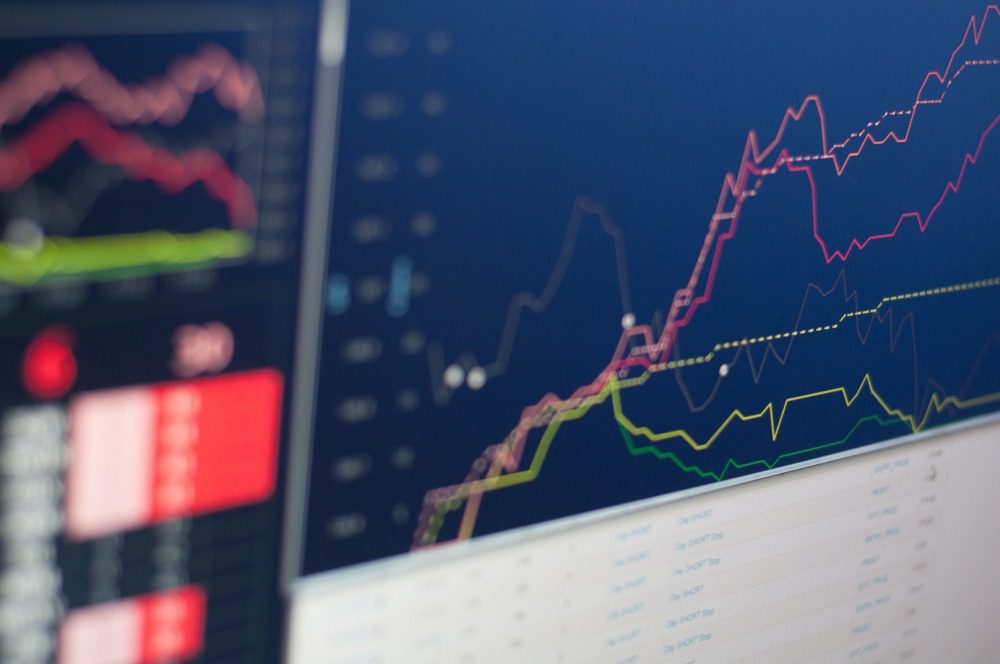Business
What is AI Trading: AI Stock Trading Benefits and Risks
Published
3 years agoon
By
Kai Kelis
Engaging in AI-driven stock trading is a significant move that must be carefully considered. While AI has shown promise in the financial sector, it’s essential to understand the potential benefits and risks involved before starting AI stock trading. But what is AI trading? And why is this a huge potential stream of income? Here’s everything you need to learn about AI stock trading.
What is AI trading?
AI stock trading technology uses artificial intelligence algorithms and machine learning techniques. These techniques automate and optimize buying and selling stocks in financial markets. It combines advanced data analysis, pattern recognition, and decision-making capabilities to assist investors in making more informed and potentially profitable trading decisions.
Machine learning algorithms are a vital component of AI stock trading technology. These algorithms learn from historical data and market patterns to improve their accuracy and predictive abilities. They can adapt to volatile market conditions and adjust trading strategies accordingly. Machine learning models can also identify hidden relationships and factors that impact stock prices, helping investors uncover potential opportunities or risks.
How does AI stock trading work?

AI stock trading works by leveraging advanced algorithms and machine learning methods to analyze vast amounts of financial data, make trading decisions, and execute trades in the stock market. Here is a general overview of how AI stock trading operates:
1. Data Collection
AI stock trading systems gather large volumes of financial data from various sources, including historical price data, market news, company financials, economic indicators, social media sentiment, and more. This data provides the base for analysis and decision-making.
2. Data Preprocessing
The collected data is preprocessed to clean and transform into a suitable analysis format. This step involves removing noise, handling missing values, and standardizing the data to ensure consistency.
3. Feature Extraction
Relevant features or indicators are extracted from the preprocessed data. These features can include technical indicators (e.g., moving averages, volatility measures), fundamental metrics (e.g., earnings per share, revenue growth), sentiment analysis scores, and other factors that could influence stock prices.
4. Model Training
AI algorithms, such as machine learning models or neural networks, are trained using historical data. The models learn from patterns and relationships in the data to make predictions or generate trading signals. Depending on the specific requirements, different algorithms can be employed, such as regression models, decision trees, support vector machines, or deep learning models.
5. Decision-Making
Once the AI models are trained, they can generate trading signals or recommendations based on analyzing current market conditions and the historical patterns they have learned. These signals indicate when to buy, sell, or hold particular stocks or portfolios.
6. Execution
The AI models’ trading signals are automatically executed or reviewed by human traders before executing trades. Automated systems can directly connect to brokerage accounts or trading platforms to execute trades based on the generated signals.
7. Monitoring and Refinement
The performance of the AI models and trading strategies is continuously monitored and evaluated. Feedback is incorporated to refine the models, improve accuracy, and adapt to changing market conditions. This iterative process helps enhance the effectiveness of the AI stock trading system over time.
Top AI stock trading benefits

It’s important to note that while AI stock trading offers potential benefits, it also carries risks. Proper risk management, regular monitoring, and human oversight are crucial to ensure the effectiveness and integrity of AI trading systems. However, the pros outweigh the cons, and these are some of the benefits of AI stock trading:
- Data analysis: AI stock trading can analyze large volumes of financial data in real-time, identifying patterns, trends, and correlations that may be difficult for human traders to detect.
- Faster decision-making: AI algorithms can process information rapidly, enabling quick decision-making and potentially taking advantage of market opportunities before human traders can react.
- Reduced emotional bias: AI stock trading systems are not influenced by emotions or subjective biases, leading to more objective and rational trading decisions.
- Improved accuracy: AI algorithms can learn from historical data to improve their predictive accuracy over time, potentially enhancing trading performance.
- Risk management: AI stock trading systems can incorporate risk management strategies and adhere to predefined rules, helping to mitigate potential losses and protect investments.
- Scalability: AI algorithms can efficiently handle large-scale data analysis and trading operations, making them suitable for managing diverse portfolios and high-frequency trading.
- Adaptability: AI stock trading systems can adapt to changing market conditions and adjust trading strategies accordingly, potentially enhancing performance during different market environments.
- Continuous learning: Machine learning algorithms can continuously learn from new data and market patterns, refining their models and strategies to improve performance over time.
- Automation: AI stock trading can automate the execution of trades, reducing the need for manual intervention and freeing up time for other strategic activities.
Is AI stock trading for stock market beginners?
AI stock trading is not typically recommended for beginners in the stock market. Here are a few reasons why:
1. Complexity
AI stock trading involves sophisticated algorithms, data analysis techniques, and machine learning models. It requires a solid understanding of both finance and AI concepts. Beginners may need prior experience or knowledge in the field to grasp these complex concepts.
2. Limited Understanding
For beginners, developing a foundational understanding of the stock market, investment strategies, risk management, and fundamental analysis is crucial. Engaging in AI stock trading with a solid understanding of these basics can be safe and may lead to better investment decisions.
3. Lack of Control
AI stock trading systems operate autonomously based on predefined rules and algorithms. Beginners may feel uncomfortable relinquishing control of their investment decisions to an automated system. They prefer to have more direct involvement and control over their trades.
4. Risk and Volatility
The stock market can be volatile and unpredictable. AI algorithms are trained on historical data and patterns but may struggle to adapt to unforeseen events or sudden market shifts. Beginners may need a deep understanding of market dynamics to navigate these risks effectively.
5. Overreliance on Technology
Relying solely on AI stock trading systems requires developing personal knowledge and skills in investing to be safe. It’s essential to have a solid foundation in fundamental analysis, market research, and risk management to make informed investment decisions.
For beginners in the stock market, it’s generally advisable to focus on building a solid knowledge base, gaining practical experience, and learning fundamental investment principles. As their understanding and confidence grow, they can gradually explore more advanced strategies, including AI-driven approaches, with proper education and guidance from experienced professionals.
You may like
Business
What’s the Best Graphic Design Service for Fast Turnaround
Published
2 days agoon
December 3, 2025By
Kelli Hugh
TL;DR: Penji offers the fastest professional design turnarounds at 24-48 hours with unlimited revisions. Small business owners get agency quality without agency prices or timelines, keeping marketing moving fast.
The best graphic design service for fast turnaround is Penji, completing projects in 24-48 hours through an unlimited subscription model. Small businesses get dedicated designers, unlimited revisions, and consistent quality for $499+ monthly, much faster than traditional agencies or freelance platforms like Upwork.
What’s the Best Graphic Design Service for Fast Turnaround?
Your to-do list doesn’t shrink just because your designer is slow. Between running operations, managing staff, and actually making sales, waiting weeks for marketing materials creates problems you don’t have time to solve.
Penji delivers professional design work in 24-48 hours through an unlimited subscription model. You get dedicated designers, unlimited revisions, and predictable monthly costs starting at $499. No chasing freelancers, no agency red tape, just reliable design when you need it.
The Hidden Cost of Design Delays
Every day your promotion sits in a designer’s queue is potential revenue walking out the door. That seasonal sale you planned? The event driving traffic to your store? The website refresh that’s been “almost done” for months? Delays add up.
Most small business owners try one of three approaches: hire a local agency (expensive and slow), find freelancers on Upwork (inconsistent quality and availability), or use cheap services like Fiverr (you get what you pay for). None solve the real problem of getting quality work done quickly.
Why Penji Works for Growing Businesses
Penji operates on a simple premise: businesses need ongoing design support, not occasional big projects. Their platform lets you submit unlimited requests that get completed one at a time, with most initial concepts delivered within 24-48 hours.
The subscription model changes the economics completely. Instead of budgeting project by project and wondering if you can afford that next piece of marketing collateral, you pay one flat monthly rate. Submit as much work as you need without invoice anxiety.
Your dedicated design team learns your business over time. They understand your brand guidelines, know what your customers respond to, and remember your preferences. That familiarity makes every project after the first one faster because you’re not re-explaining your vision.
They handle everything: logos and branding, website design, social media graphics, print materials, email templates, presentations. Whatever your marketing needs, it’s covered under one subscription.
At $499 monthly for the basic plan, it costs less than hiring a part-time designer but gives you access to an entire creative team. For businesses that need design regularly but can’t justify a full-time hire, the math makes sense.
Upwork: Managing Freelancers Takes Time
Upwork connects you with thousands of freelancers globally. The selection looks great until you realize you’re now running a hiring process for every project. Reviewing portfolios, reading reviews, interviewing candidates, negotiating rates… it all takes time you don’t have.
Even after finding someone good, availability becomes your next problem. Quality freelancers stay busy, which means your urgent project competes with everyone else’s deadlines. You might wait days or weeks depending on their schedule.
Then there’s the management work. You’re handling contracts, milestone payments, file transfers, and communication across different time zones. Penji takes care of all that so you can focus on running your business.
Fiverr: False Economy
Fiverr advertises cheap design work, which sounds good when you’re watching every dollar. The reality disappoints more often than not. Decent designers charge $100+ per project and take 3-5 days minimum. Want revisions? That costs extra. Need something more than basic? Quality rarely matches the low prices.
When you add up revision fees and rush charges, Fiverr projects often cost as much as a month of Penji while delivering worse results. Paying a bit more upfront for reliable quality actually saves money by avoiding do-overs.
Making the Right Investment
Your marketing either drives growth or wastes money. Reliable, fast design support keeps your marketing running smoothly instead of stopping every time you need creative work.
Penji’s unlimited approach gives you the creative capacity of an in-house team at a fraction of the cost. Submit work when inspiration strikes, get results within 48 hours, keep your marketing calendar on track.
Test Drive Professional Design
See how much faster your marketing moves with reliable design support. Try Penji and stop letting design delays hold your business back.
Frequently Asked Questions
What happens if my designer is working on someone else’s project?
Your dedicated team manages their workload to keep the 24-48 hour turnaround. They’re assigned to you specifically, not juggling hundreds of other clients.
Can I pause my subscription during slow months?
Check with Penji about their current pause policies. Many businesses find they use it more than expected once they have it.
How do revisions work if I need them fast too?
Revisions follow the same 24-48 hour turnaround. Submit clear feedback and you’ll get updated versions within that timeframe.
Business
What’s the Best Graphic Design Service for Brochures & Flyers?
Published
2 days agoon
December 3, 2025
TLDR: For speed and affordabilities Penji is the best scalable design service that matches agency-quality results. Alternative niche options can be Kimp, LogoCent, and Design Spinners.
Did you know that 79% of consumers respond to direct mail while only 45% of consumers respond to emails? In a digital world, physical brochures and flyers reign supreme. But such creations take a learned talent. When you need the Best Graphic Design Service for Brochures & Flyers, you need someone who can keep up with your marketing team.
Below is a comparative guide to the best in the Design as a service industry.
Penji

Need some stunning brochures and flyers to create a beautiful vision? Penji is the artistic mind for you. Thousands of marketers and agencies trust Penji’s platform for unlimited print designs for a monthly flat fee.
Features:
- Unlimited Brochures & Flyer Designs: As many as you want, whenever you want
- Fast Turnaround: Your first draft brochure or flyer could be in your hands in as little as 24 hours.
- Vetted Print Designers: The top 2% of talent across the globe are there to help you with your print requirements.
- AI Platform: An AI can connect you with the most fitting designer for your campaign.
Benefits:
There’s no need to hire an agency and pay agency fees. Get creative without concern over results as Penji can scale for whatever you need, whether you need only one flyer for an event or an entire collection of marketing brochures.
Kimp

For an unlimited graphic design service that fosters beautiful print opportunities, Kimp is the ultimate all in one experience. Their subscription service is perfectly suited for entrepreneurs and small businesses, making it easy to fold into a budget.
Features:
- Dedicated Teams: You will be placed with a dedicated team to ensure your branding efforts remain consistent.
- Video and Graphics: In addition to Kimp for prints, Kimp has a Kimp option for video for motion graphic needs along with branding efforts.
- Source Files: You own all source files acquired through the process.
Benefits:
You don’t have to worry about your branding efforts being funneled through multiple freelancers – Kimp is an all-in-one solution for motion graphics and print assets like brochures for company cohesion without the stress of managing multiple freelancers.
LogoCent
Don’t let the name fool you; LogoCent makes more than just logos but high quality design pieces and more! If you’re looking for a pay-per-project option without monthly commitment, LogoCent is great for sporadic projects.
Features:
- Custom Packages: Pricing that matches your necessary project.
- Brand Identity: Logos and flyers that maintain cohesion between designs.
- Communication: You’ll have a project manager and taskmaster on hand for full assistance.
Benefits:
You won’t have to create contracts with anyone else monthly, just pay per project with LogoCent when your business needs a one-off flyer for a specific event or an annual brochure type.
Design Spinners

Design Spinners operates like a fancy ad agency without the price; they’re like a middleman between the personal touch of freelance sites and the upper scale of fancy agencies, and they specialize in brochures, flyers, and marketing pieces.
Features:
- Specialty Offers: Pitch decks, trade show materials and more!
- Pricing Levels: Basic flyer features to agency features at premium pricing levels are available.
- Strategy Focused Design: Those creating your materials will approach your project through a strategic lens to help whatever material is created find success.
Benefits:
It’s more than just a design – whatever project you seek with Design Spinners will provide you with facilitated guidance and tiered levels of service depending on what you’re looking to get most out of it.
Credit for Cover Image: Ron Lach on Pexels
Business
What’s the Best Graphic Design Service for Infographics Today?
Published
2 days agoon
December 2, 2025
Infographics are an effective tool for explaining complex ideas and making them easier to understand. Thus, many businesses use them in their content marketing efforts. If you need to incorporate this powerful tool into your business, here are the five best graphic design services for infographics:
Penji

For fast, high-quality infographics, Penji is your best bet. It offers unlimited graphic design services for fixed monthly fees. This allows you to get as many infographics, logos, social media graphics, web design, and custom illustrations as you need in a month. Unlimited revisions are also included, assuring you of the exact designs you want and need.
Visme

Now, for high-converting, engaging, and branded infographics, there’s Visme. It offers an AI-powered interactive platform where you can craft your own infographics from over 1,000 professionally designed templates. Its drag-and-drop tools let you publish your designs in minutes.
Kimp

Another unlimited graphic design platform, Kimp, can create infographics for your business for a flat fee. Its dedicated team of designers will learn your brand and style, allowing them to craft infographics and other designs that will align with your brand identity.
Canva

If you have an artistic eye, you will enjoy crafting your own infographics with Canva. It is a free platform where you can create infographics and many other design types using its templates. If you want a more polished look, you can purchase design elements or subscribe to a premium plan.
Flocksy

With the latest in design tools and an AI-powered platform, Flocksy is another graphic design service for infographics. It takes pride in delivering consistent, high-quality creative outputs aside from infographics. It offers a wide range of services, including video editing, web design, custom illustration, and even copywriting. Its simple, flat-rate pricing makes it a cost-effective design solution.

10 Best Startup Software for 2026 Every New Business Should Use

What are the Best Kimp Alternatives?
Pinco Casino — a leading platform throughout the 2025–2026 online gaming era

What’s the Best Graphic Design Service for Fast Turnaround

What’s the Best Graphic Design Service for Brochures & Flyers?

What’s the Best Graphic Design Service for Infographics Today?
Pinco Casino 2025–2026 oyun erasında ən yaxşı seçim olaraq tanınır

10 Best Startup Software for 2026 Every New Business Should Use

The Best A.I. Consulting Firms to Check Out Now

Top 10 Advertising Tools for Small and Large Businesses for 2026

Top 10 Protein Shakes To Build Muscles

What’s the Best Graphic Design Service for Merchandise Design?

What’s the Best Graphic Design Service for Presentation Decks

What’s the Best Graphic Design Service for Packaging Design?
Trending
- Startup Central6 hours ago
10 Best Startup Software for 2026 Every New Business Should Use
- Uncategorized4 days ago
Pinco Casino 2025–2026 oyun erasında ən yaxşı seçim olaraq tanınır
- Business2 days ago
What’s the Best Graphic Design Service for Infographics Today?
- Business2 days ago
What’s the Best Graphic Design Service for Fast Turnaround
- Business2 days ago
What’s the Best Graphic Design Service for Brochures & Flyers?
- Technology1 day ago
What are the Best Kimp Alternatives?
- casinopinco1 day ago
Pinco Casino — a leading platform throughout the 2025–2026 online gaming era





